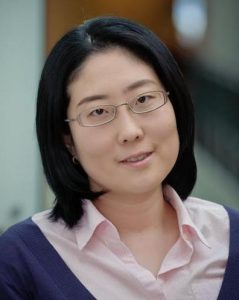Bio
“Mining Big Data for Molecular Marker Detection”

Professor Su-In Lee is an Assistant Professor in the Departments of Computer Science & Engineering and Genome Sciences at the University of Washington. She received her Ph.D. degree in Electrical Engineering from Stanford University in 2009. Before joining the UW in 2010, she was a Visiting Assistant Professor in the Computational Biology Department at Carnegie Mellon University.
Her interest is in developing advanced machine learning algorithms to analyze high-throughput data to 1) discover molecular mechanisms of diseases, 2) identify therapeutic targets, and 3) develop personalized treatment plans given an individual’s molecular profile.
She has been named an American Cancer Society Research Scholar and received the NSF CAREER award. Her lab is currently funded by the American Cancer Society, the National Institutes of Health, the National Science Foundation, the Institute of Translational Health Sciences and the Solid Tumor Translational Research.
 Click here to view webcast.
Click here to view webcast.
Abstract
“Mining Big Data for Molecular Marker Detection“
The repertoire of drugs for patients with cancer is rapidly expanding, however cancers that appear pathologically similar often respond differently to the same drug regimens. Methods to better match patients to specific drugs are in high demand. There is a fair amount of data on molecular profiles from patients with cancer. The most important step necessary to realize the ultimate goal is to identify molecular markers in these data that predict the response to each of hundreds of chemotherapy drugs. However, due to the high-dimensionality (i.e., the number of variables is much greater than the number of samples) along with potential biological or experimental confounders, it is an open challenge to identify robust biomarkers that are replicated across different studies.
In this talk, I will present two distinct machine learning techniques to resolve these challenges. These methods learn the low-dimensional features that are likely to represent important molecular events in the disease process in an unsupervised fashion, based on molecular profiles from multiple populations of patients with specific cancer type. I will present two applications of these two methods – acute myeloid leukemia (AML) and ovarian cancer. When the first method was applied to AML data in collaboration with UW Hematology and UW’s Center for Cancer Innovation, a novel molecular marker for topoisomerase inhibitors, widely used chemotherapy drugs in AML treatment, was revealed. The other method applied to ovarian cancer data led to a potential molecular driver for tumor-associated stroma, in collaboration with UW Pathology and UW Genome Sciences. Our methods are general computational frameworks and can be applied to many other diseases.
 Click here to view webcast.
Click here to view webcast.